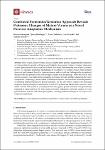Combined Proteomics/Genomics Approach Reveals Proteomic Changes of Mature Virions as a Novel Poxvirus Adaptation Mechanism
Grossegesse, Marica
Döllinger, Jörg
Tyshaieva, Alona
Schaade, Lars
Nitsche, Andreas
DNA viruses, like poxviruses, possess a highly stable genome, suggesting that adaptation of virus particles to specific cell types is not restricted to genomic changes. Cowpox viruses are zoonotic poxviruses with an extraordinarily broad host range, demonstrating their adaptive potential in vivo. To elucidate adaptation mechanisms of poxviruses, we isolated cowpox virus particles from a rat and passaged them five times in a human and a rat cell line. Subsequently, we analyzed the proteome and genome of the non-passaged virions and each passage. While the overall viral genome sequence was stable during passaging, proteomics revealed multiple changes in the virion composition. Interestingly, an increased viral fitness in human cells was observed in the presence of increased immunomodulatory protein amounts. As the only minor variant with increasing frequency during passaging was located in a viral RNA polymerase subunit and, moreover, most minor variants were found in transcription-associated genes, protein amounts were presumably regulated at transcription level. This study is the first comparative proteome analysis of virus particles before and after cell culture propagation, revealing proteomic changes as a novel poxvirus adaptation mechanism.
Dateien zu dieser Publikation
Keine Lizenzangabe

